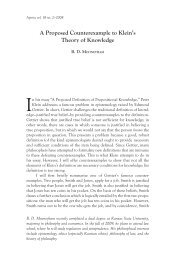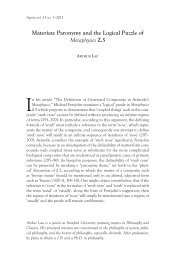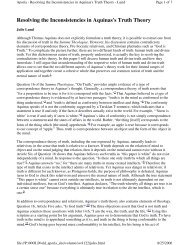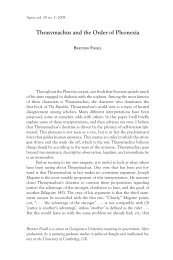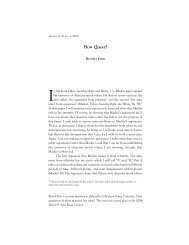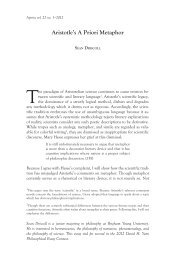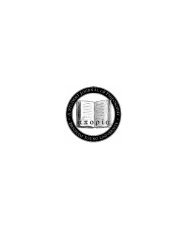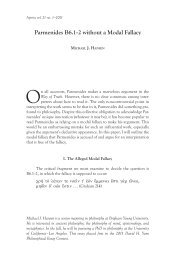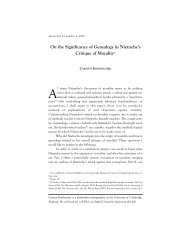Hermeneutics after Kant - Aporia - Brigham Young University
Hermeneutics after Kant - Aporia - Brigham Young University
Hermeneutics after Kant - Aporia - Brigham Young University
Create successful ePaper yourself
Turn your PDF publications into a flip-book with our unique Google optimized e-Paper software.
74<br />
Nate NoorlaNder<br />
problem.” In this paper I deal with the way this problem was treated in<br />
hermeneutics by the nineteenth-century figure Friedrich Schleiermacher,<br />
who investigated how a subject could understand the objective meaning of<br />
a text. I will argue that the question is a bad one, as demonstrated by Martin<br />
Heidegger and Hans-Georg Gadamer. Heidegger and Gadamer show us<br />
that the question is intelligible only in a subject/object ontology that cuts<br />
subjects off from the world, and that to overcome the problem we need<br />
to reconsider our relationship with the world. With this as philosophical<br />
background, Gadamer ultimately argues that interpretation necessarily occurs<br />
within the bounds of tradition and prejudice.<br />
Immanuel <strong>Kant</strong><br />
In the Critique of Pure Reason <strong>Kant</strong> adds two types of judgments to<br />
the traditional distinction between a priori and a posteriori: analytic and<br />
synthetic. In an analytic judgment the predicate is contained in the subject;<br />
i.e., analytic judgments are true by definition. In a synthetic judgment<br />
the predicate is not contained in the subject; i.e., the predicate tells us<br />
something new about the subject, something not already contained in its<br />
definition.<br />
<strong>Kant</strong>’s predecessors would have instinctively equated a priori judgments<br />
with analytic judgments and a posteriori judgments with synthetic<br />
judgments. <strong>Kant</strong>’s most original contribution to this discussion is the classification<br />
of “synthetic a priori” judgments. These judgments are based on<br />
concepts that cannot be derived from experience, but they are nevertheless<br />
employed in experience. For example, the statement “every event has a<br />
cause” cannot be derived from experience because the concept of necessity<br />
can’t be empirically derived. Yet the judgment seems to be true necessarily.<br />
So it is a judgment whose predicate—cause—is not by definition a part of its<br />
subject—event. How is such a judgment possible (<strong>Kant</strong> 19–23)?<br />
If we operate under the assumption that to know something our mind<br />
must conform to the world, then it is not possible, for in this case we can’t<br />
have knowledge without experience. But <strong>Kant</strong>, in Copernican fashion, posited<br />
the reverse: it is not the mind that conforms to the world, but the world<br />
that conforms to the mind (xxxiv–xxxviii). This doesn’t mean that the world<br />
transforms into something other than it is, it simply means that in any<br />
event of understanding the world is perceived according to the mode in<br />
which the mind understands. In other words, the mind forces the world<br />
to conform to the way it understands, similar to the way we force the world to<br />
appear in certain shades when we wear sunglasses. Our minds possess certain<br />
categories, and we impose these on our sensory experience, subsuming



